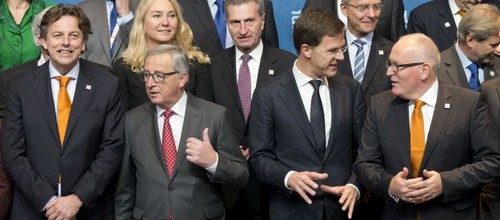(VOVworld)- The Netherlands has taken the EU Presidency from Luxemburg. Amidst numerous difficulties taking place in Europe, the Netherlands’ 6-month term will not be easy.

Dutch Foreign Minister Bert Koenders, European Commission President Jean-Claude Juncker, Dutch Prime Minister Mark Rutte, and First Vice-President of the European Commission Frans Timmermans, front row from left, and other members of the EU commission pose for a group photo in Amsterdam, Netherlands, Jan. 7, 2016. Photo: AP |
Challenges that the Netherlands will have to face while in charge of the EU include security instability, threats of terror attacks, the influx of refugees to Europe, slow economic growth and divided politicians.
The Dutch government says it will focus on the implementation of migration and international security, innovation and job creation in Europe, achieving financial stability and strengthening the Eurozone by supporting economic growth and putting the budgets of member states in order and implementing a stable climate and energy policy. The Dutch Foreign Minister Bert Koenders introduced the four Dutch priorities in a message to the European Parliament in late 2015. The Dutch Foreign Minister says the Netherlands will play a key role in the next 6 months to help the EU back on track.
Bert Koenders says the migrant crisis reveals the EU’s limitations in issues concerning security and law. He urged the EU to take a common approach in settling root causes concerning politics and economics to seek solutions to human trafficking and border control problems. The Dutch EU Presidency coincided with the Single Resolution Mechanism which began operational on January 1 aiming to prevent crisis in the Eurozone and allow the closures of banks that are on verge of bankruptcy. The European economy is recovering slowly. That’s why the Netherlands says it will focus on creating a sustainable growth and generating jobs during its 6-month term. The Netherlands intends to encourage EU countries to implement trade agreements and protect laborers more effectively. Amidst divisions within Europe, the Netherlands stressed the importance of connecting EU citizens to gain their support. The Netherlands will also have to deal with the so-called Brexit during its term as EU president in the first six months of this year. The United Kingdom government plans to hold a referendum on whether the UK will remain in the EU before the end of this year. By the EU Spring Summit which will be held in February, the Netherlands will have to work with other 27 EU countries to respond to the UK’s four-point plan of key demands as the price for keeping Britain in the European Union. These are protecting the single EU market for the UK and other countries that have not adopted the euro as their currency, boosting competitiveness by cutting red tape, exempting the UK from the stated EU goal of "ever closer union" and bolstering national parliaments and restricting benefits to working migrants in a bid to make moving to the UK less attractive.
With a priority for energy and climate, the Netherlands pledged to find solutions to issues concerning climate, the environment, and sustainability and promised to work for a European energy alliance and a future-oriented climate policy.